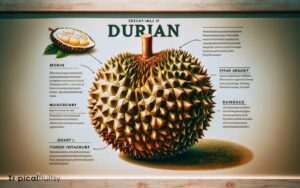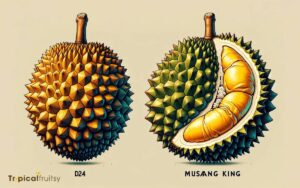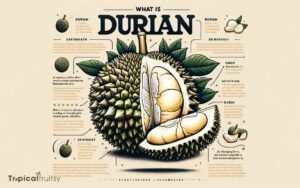Is It Okay to Drink Water After Eating Durian? Explained!
It is generally safe to drink water after eating durian. Despite common myths suggesting otherwise, there is no scientific evidence to support the notion that drinking water immediately following durian consumption is harmful.
In fact, staying hydrated is vital for overall health, and there are no known interactions between durian and water that would lead to adverse health effects.
The belief that drinking water after eating durian can cause stomach discomfort or other health issues is largely anecdotal.
Durian itself is a creamy and rich fruit that can cause bloating or indigestion in some individuals due to its high fiber and sulfur content. However, these effects are not exacerbated by water intake.
It is important to consume durian in moderation and listen to your body’s signals:
Enjoying durian in moderation and staying hydrated is key to relishing the fruit without discomfort.
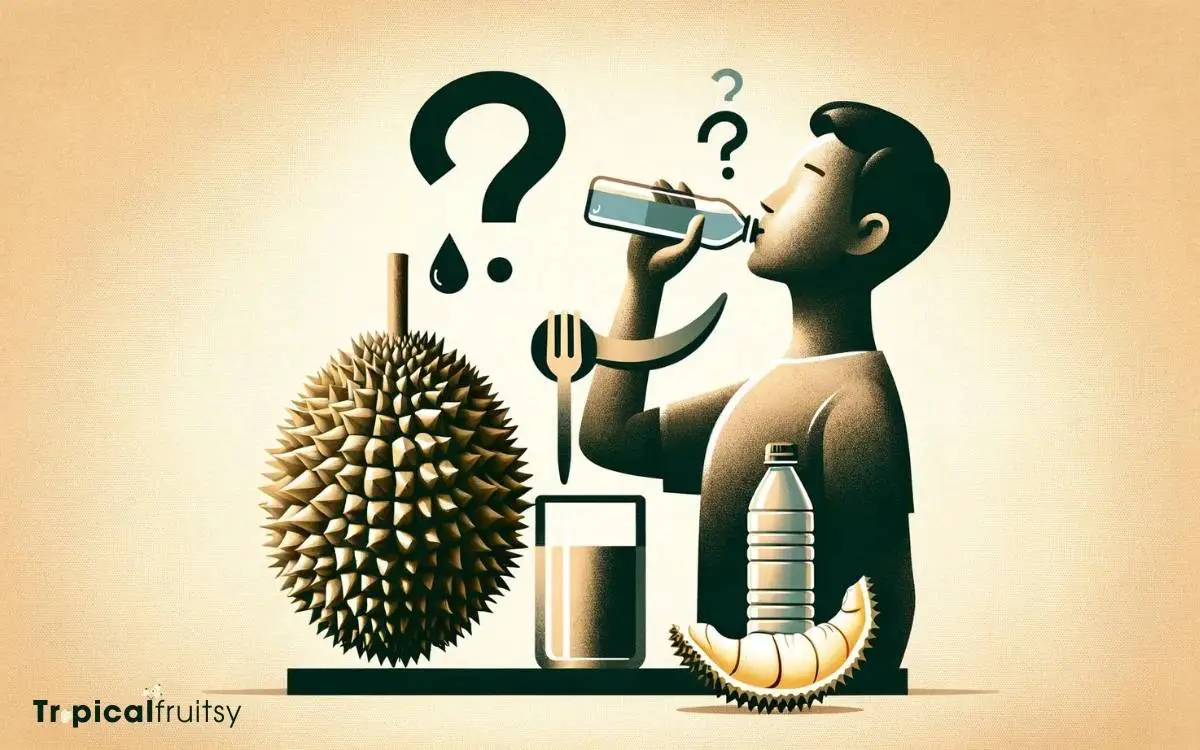
Key Takeaway
Is It Safe to Drink Water After Eating Durian?
| Factor | Description | Considerations |
|---|---|---|
| Fiber content | Durian is high in fiber, which aids in digestion but can cause bloating if overconsumed. | Eat in moderation to avoid bloating. |
| Sulfur compounds | The fruit contains sulfur, which contributes to its strong smell and can affect digestion. | Be aware of the potential for odor. |
| Water interaction | There is no evidence that water reacts negatively with durian, it is safe to drink afterward. | Stay hydrated to maintain health. |
| Cultural beliefs | Some cultures suggest avoiding water after durian, but this lacks scientific backing. | Consider scientific evidence over myth. |
| Health considerations | Overeating durian can lead to indigestion, unrelated to water consumption. | Limit intake and observe body response. |
Understanding Durian Fruit

Before delving into the safety of consuming water post-durian consumption, it is essential to comprehend the unique characteristics of the durian fruit, commonly referred to as the ‘king of fruits’ in Southeast Asia.
Durian is distinguished by its formidable thorn-covered rind, pungent aroma, and rich custard-like flesh.
Nutritionally, it is dense in calories, vitamins, and minerals, notably vitamin C and potassium. The fruit’s high sulfur content is thought to be responsible for its distinctive smell, which can be off-putting to some while alluring to others.
Scientific analysis reveals that durian contains compounds that may influence blood pressure and blood sugar levels.
Understanding these properties is crucial when examining how water intake might interact with the digestive and metabolic processes following durian consumption.
Common Durian Myths

Numerous myths surround the consumption of durian, one of which involves the potential health risks of drinking water after eating the fruit.
This particular myth suggests that consuming water in proximity to durian intake may lead to indigestion or bloating, but such claims lack scientific substantiation.
Analysis of the fruit’s composition reveals no inherent properties that would chemically react with water to cause adverse effects.
In fact, hydration is essential for digestion, and there is no evidence to support the notion that water should be avoided after durian consumption.
Other durian-related myths include exaggerated fears of cholesterol spikes and severe weight gain. While durian is calorie-dense, moderate consumption within a balanced diet is unlikely to cause significant health issues.
It is vital to approach durian consumption with a balanced perspective, informed by empirical data rather than anecdotal cautions.
Durian and Hydration

The importance of staying hydrated is well-documented, and consuming water after eating durian is not only safe but also beneficial for maintaining proper hydration levels.
Durian, being a rich and creamy fruit, can be quite filling and potentially dehydrating due to its high potassium content, which may drive the body’s need for water.
Here are key points to consider:
- Durian’s high potassium level: Balances fluids but may increase the need for hydration. – Water aids digestion: Helps manage the heavy feel of durian in the stomach.
- Thirst perception: Durian’s strong flavor can mask thirst; water intake is crucial.
- Heatiness: In traditional beliefs, durian is ‘heaty’; water counters this by cooling the body.
Understanding these factors underscores the value of water intake post-durian consumption.
Potential Health Concerns

Consuming water after eating durian has been associated with potential digestive discomfort, raising concerns about the combination’s effect on the gastrointestinal system.
Additionally, durian’s high glycemic index may lead to a rapid increase in blood sugar levels, which could be exacerbated by immediate water intake.
It is imperative to examine the scientific evidence behind these claims to provide clear dietary guidance.
Digestive Discomfort Risk
Several individuals report experiencing digestive discomfort after consuming water immediately following durian intake, raising potential health concerns.
While conclusive scientific evidence on this matter is limited, the anecdotal evidence suggests a correlation that warrants a closer investigation.
The potential causes for such discomfort might include:
- Indigestion: The combination of durian’s high sugar content with water may lead to fermentation in the gut, causing indigestion.
- Bloating: Rapid ingestion of water after eating durian might result in bloating due to gas formation.
- Gastrointestinal Distress: People with sensitive stomachs may experience increased acidity or reflux when water dilutes gastric juices.
- Delayed Digestion: Drinking water immediately after durian might slow down the digestive process, leading to discomfort.
Individuals concerned about these potential risks should consider moderating their intake and observing how their body reacts to determine the best course of action.
Blood Sugar Spike
Drinking water post-durian consumption may exacerbate blood sugar spikes, posing a concern for individuals with diabetes or those sensitive to blood glucose fluctuations.
Durian fruit, while nutritious, is high in sugars and carbohydrates, which can lead to a rapid increase in blood glucose levels.
The glycemic index (GI) of durian is relatively high, which suggests it has a more significant impact on blood sugar than other fruits.
When water is ingested immediately after eating durian, it may potentially hasten the absorption of sugars, amplifying the glycemic response. This effect could be particularly acute in individuals with impaired glucose tolerance.
For those monitoring blood sugar, it’s advisable to moderate durian intake and monitor post-consumption effects.
As we assess the health implications, it’s interesting to contrast these concerns with cultural perspectives on durian consumption.
Cultural Perspectives on Durian

Cultural attitudes toward durian, often dubbed the ‘king of fruits’ in Southeast Asia, vary widely, with some communities venerating its pungent aroma and rich flavor while others find it less appealing.
The divergent views on durian are deeply rooted in cultural traditions and personal taste preferences.
To understand these perspectives, consider the following points:
- In many parts of Southeast Asia, durian is celebrated with festivals and eating competitions.
- Certain social norms dictate where and when durian can be consumed, due to its strong smell.
- The fruit is believed to have warming properties in traditional medicine, impacting consumption patterns.
- Durian’s status as a luxury item in some regions influences its cultural significance and the occasions on which it is enjoyed.
These aspects highlight the intricate cultural tapestry surrounding durian consumption.
Expert Opinions on Consumption
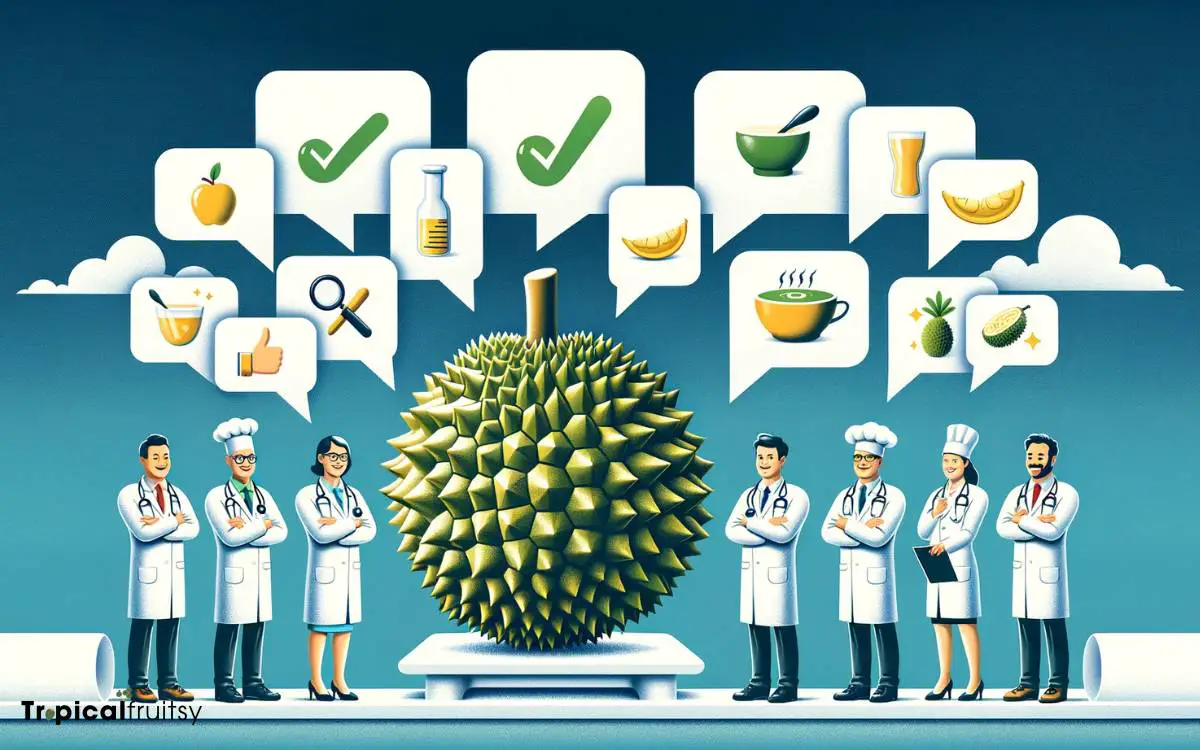
Transitioning from cultural norms to scientific understanding, experts often debate the merits and potential risks of consuming water after eating durian.
While traditional beliefs hold that the combination can cause discomfort or digestive issues, there is a lack of empirical evidence to substantiate these claims.
Nutritionists and food scientists suggest that drinking water after consuming durian might actually aid digestion and help the body process its high sugar and rich fat content.
However, they advise moderation, noting that excessive water intake in a short period can lead to discomfort due to stomach distension.
Ultimately, experts advocate for individual awareness of one’s own digestive responses, emphasizing that the body’s reaction to such food and beverage pairings can vary from person to person.
Debunking Durian Misconceptions
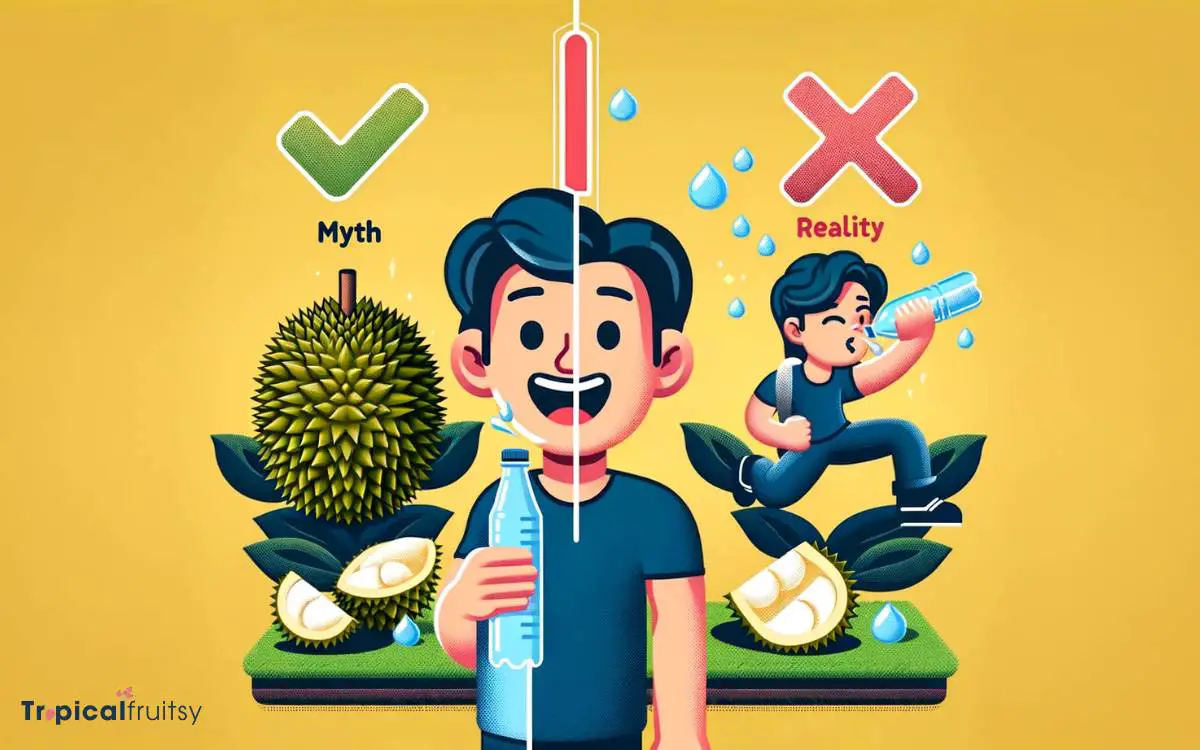
Scientific scrutiny has dispelled several myths surrounding durian consumption, including the oft-cited danger of drinking water afterwards.
Through rigorous analysis, the following misconceptions have been debunked:
- Immediate health risks: No evidence suggests that drinking water after eating durian poses a significant health threat.
- Digestive complications: Research indicates that water does not adversely affect the digestion of durian.
- Toxic interactions: The belief that water and durian create a toxic mix has been proven unfounded.
- Alcohol-like effects: Contrary to some claims, water does not intensify the natural fermentation of durian in the stomach to produce alcohol-like symptoms.
These clarifications offer a more nuanced understanding of durian consumption.
Best Practices for Durian Consumption

Building on durian enthusiasts’ relief that water poses no threat post-consumption, let us now explore recommended practices to enhance the experience of eating this king of fruits.
To begin with, selecting a durian requires scrutiny; mature fruits typically emit a distinct aroma and yield slightly to pressure.
Once opened, the creamy flesh should be consumed promptly, as exposure to air can affect flavor and freshness.
Moderation is advised, given the fruit’s high caloric content and rich composition. For individuals with underlying health conditions, particularly diabetics, portion control is crucial due to its high sugar content.
To facilitate digestion and mitigate potential side effects, such as indigestion or bloating, pairing durian with fibrous foods is recommended.
Lastly, proper hand and mouth hygiene post-consumption can prevent lingering odors.
Final Thoughts on Durian and Water

The consumption of water following durian intake is deemed safe, dispelling myths and confirming proper hydration as an essential aspect of dietary habits.
Scientific scrutiny reveals no adverse interactions between durian and water consumption.
Moreover, hydration is a critical factor for digestion and overall well-being, particularly when consuming foods high in sugar and fat, such as durian.
- Hydration Importance: Water aids in the digestion of durian’s rich content.
- Myth Dispelling: No evidence supports the notion that water and durian cause harm.
- Health Considerations: Adequate water intake is vital for metabolic processes.
- Cultural Beliefs: While respecting traditional views, modern research guides current recommendations.
How to Reduce Heatiness After Eating Durian

Durian, known for its unique taste and aroma, is also notorious for causing heatiness in some individuals due to its high sugar and fat content.
If you experience heatiness after eating durian, here are some tips to help reduce it:
- Stay Hydrated: Drink plenty of water to help flush out toxins from your body. Keeping yourself hydrated can also help cool down your body temperature.
- Eat Cooling Foods: Consume foods that are considered cooling in traditional Chinese medicine, such as watermelon, cucumber, coconut water, or green tea. These foods can help balance the heatiness caused by durian.
- Avoid Spicy or Fried Foods: Stay away from foods that can exacerbate heatiness, such as spicy or fried dishes, as they can further increase internal heat.
- Consume Herbal Teas: Drink herbal teas like chrysanthemum tea or barley water, which are believed to have cooling properties and can help alleviate heatiness.
- Rest and Relax: Engage in activities that promote relaxation and reduce stress, as stress can worsen symptoms of heatiness. Practice deep breathing exercises, meditation, or take a short nap to help your body recover.
- Ginger Tea: Some people find relief from heatiness by drinking ginger tea. Ginger is believed to have properties that help balance the body’s temperature.
- Avoid Alcohol and Caffeine: Alcohol and caffeine can dehydrate the body and exacerbate symptoms of heatiness. It’s best to avoid or limit consumption of these beverages.
- Moderate Consumption: If you’re prone to heatiness, consider moderating your intake of durian or pairing it with other foods that can help balance its effects.
- Consult a Healthcare Professional: If you experience severe discomfort or prolonged symptoms of heatiness after eating durian, it’s advisable to consult a healthcare professional for further evaluation and advice.
Remember that individual responses to foods vary, so what works for one person may not work for another. It’s essential to listen to your body and adjust your diet accordingly.
Conclusion
The interplay between durian consumption and water intake, akin to a harmonious orchestra, requires balance and understanding.
Scientific evidence dispels the myth that drinking water after eating durian poses health risks. Thus, individuals can confidently hydrate after indulging in the ‘king of fruits’ without fear of adverse effects.
The key is moderation and listening to one’s body, ensuring a symphonic blend of enjoyment and well-being.



